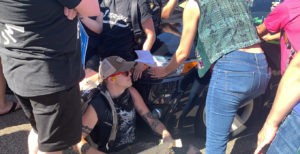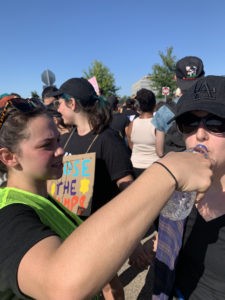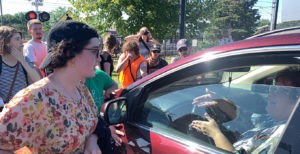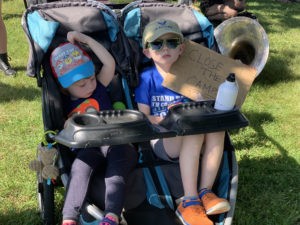Protesters had planned to block cars from exiting the area around the Bishop Henry Whipple Federal Building near Fort Snelling, but some of those drivers began nudging the protesters with their vehicles. Dozens of vehicles were prevented from leaving the area, which included MnDOT staffers, and others who worked in the area or who used the Park and Ride to take light rail or buses. The building houses Homeland Security offices and an immigration review office.

A protester sits in front of a car that had been bumping into other protesters at the Twin Cities Never Again Action rally on July 30.
“We are here to disrupt business as usual, and we’re not going to leave voluntarily until we feel satisfied that that is done,” said Leah Soule, one of the organizers. “I think that ultimately, I have to come back to that the people who are being held in ICE detention centers, they can’t go home to their families. The children that are being denied toothpaste, showers, safe places and healthy places to sleep at night, they’re not going home. To me, getting home a couple of hours late, while I empathize, people have their stuff, but, you know, ultimately, you have to remember the seriousness of what’s going on.”
Tuesday afternoon’s event at Fort Snelling was the 23rd rally nationwide since June 30, according to the group’s website. Twenty-seven of the protestors were cited for unlawful assembly. Many credited Hennepin County Sherriff’s officers, led on the scene by Lt. Patty Strongitharm for helping to de-escalate and keep protestors safe as they moved away from the cars.
“I don’t think it’s legal,” said Terry Anderson, a MnDOT employee whose pickup was at the front of the line of cars trying to leave the area and was one of the drivers who bumped the protestors with his truck. “I have no problem with protesting. I’m just trying to get home.”
Never Again Action is a mass mobilization calling for Jews to shut down ICE and hold the political establishment accountable for enabling both the deportation machine that has separated immigrant families across the U.S. for decades and the current crisis at the border.
“We came together as a group of differently affiliated Jewish organizers, recognizing that we have seen this groundwork laid before,” the group explains on its website. “We were taught to never let anything like the Holocaust happen again. We know from our own history what happens when a government targets, dehumanizes and strips an entire group of people of all their civil and human rights. We understand it to be our community’s obligation to stand up when we see history repeat itself and to declare, Never Again means Never Again for anybody.”
Holding The Line, Rooted In Judaism

Naomi Silber giving water to Rosa Druker.
Staring down angry drivers as a line of 20 people, holding hands – refusing to let go even to take a drink – singing Jewish songs and standing their ground.
“I’ve been engaged with immigrant rights for a long time and recently have started being involved in more Jewish activism,” said Rosa Druker. “And so hearing about this, I felt like this was an amazing chance for the Jewish community to speak out against this. And so it really just came together with people saying, ‘we’re ready to do something.'”
Mia Freiberg’s Judaism is rooted very much in social justice from time as a camper at Camp Gilboa in California.
“One of the (camp’s pillars) was social justice and another was actualization, so from the age of 12, my Jewish community, was one that engaged intentionally in activism,” Freiberg said. “That same summer camp has roots in Argentina where my dad and his family are from; they fled Eastern Europe and continued that legacy in South America. My mom’s family fled Kurdistan and continued that legacy in the Middle East. So it’s very personal for me.”
Druker said that spaces like the activism at the event are uniquely Jewish.
“The number one thing that makes me feel unapologetically and beautifully Jewish is when I can be in spaces like this,” Druker said. “Because of our history and tradition of resistance, of intellectual freedom, of speaking out against injustice, and I feel like all of those things are woven together in my activism and things that I am continuing to explore.”
Said Freiberg: “I also think about the phrase Tikkun Olam, healing the world. And I feel like it isn’t often thought about as a very active phrase, but to heal something is to take action.”
Soule said that what makes the national movement a Jewish issue goes back to Rabbi Hillel’s three questions: If I’m not for myself, who will be for me?; If I’m not for others, what am I?; and If not now, when?
“We know as Jews, we have a responsibility to act for the dignity of other people. The biggest
thing is to save a life, and we have seen people perish in these immigration facilities,” she said. “Obviously, much of our messaging is around the memory of the Holocaust, and really taking that lesson to the heart. When we say never again, we mean never again and to close the concentration camps that we see here in our country.
Several clergy members and elected officials were taking part in the protest. Agency executive

Jordan Breslau tries to explain to a woman trying to drive away about the purpose of the protest.
directors Carin Mrotz of Jewish Community Action and Beth Gendler of National Council of Jewish Women Minnesota stood with Nausheena Hussain and Asma Mohammed Nizami of Reviving the Islamic Sisterhood For Empowerment (RISE) to speak to the crowd.
Hussain’s speech to the crowd had barely started when a car tried to find a different route out of the area and nearly hit protestors, according to the video posted by RISE and shared by Jewish Community Action.
“It’s been painful for many of us in the Jewish community to have our trauma and how we’re allowed to talk about it used as a ploy and a distraction to keep us from fully engaging in the truth about what’s being done here,” Mrotz said. “Many communities have their own stories of persecution, detention, dehumanization, and we can’t allow ourselves to isolate those stories, to position them as special and unique historical circumstances if it keeps us from seeing the warning signs and clear implications that it could be happening again.
“The purpose of remembering our pain is not to put it in a glass case; it’s to make sure that we do everything we can to stop the pain of others. When the Jewish community says never again, it must mean never again for anyone.”
Long-time community organizer Deb Moses also spoke to the crowd. Moses is the daughter of a Holocaust survivor a member of the French resistance, and she bristled at the idea that saying ‘never again’ was an affront to the Holocaust.
“I have no idea where that came from,” she said. “As Jews, we understand having to leave to find a better life. And they are locked up for that and it is devastating. As someone who lost 60 members of my family in the Holocaust. It is disrespectful to ever allow this to happen again.”
Family Affair
As the first group who started near the south lot of the Fort Snelling Park and Ride started to come together, Beth Schmid was trying to help her 5-year-old son Teddy into the stroller he shared with his sister Maggie, 2. For Beth, it was an opportunity to help teach her kids an important lesson relating to what happened to Jews in Germany in the 1930s.

Maggie and Teddy Schmid at their first protest rally.
“To be frank, it’s difficult,” she said. “But (I told them) that people in Germany decided that other people were not as good as them. And they needed to only have the people that they thought were good enough around. And that they took the people they thought were good enough like the Jews, and put them into they call them camps. They were really prisons and that they’re using the word camp very similarly here, but it’s also putting people in prison for being different. And that’s not something that we as Jews stand for. We won’t allow it. And when we say never again, that means right now, and we’re not putting people were different than us in a prison for being different.”
Teddy was eager to participate, ready to get started as the protesters started to arrive. Maggie, on the other hand, was mostly along for the ride.
“But I think this is how you introduce the idea of standing up for yourself and others and differences and that we just don’t tolerate being treated poorly,” said Schmid, who credits her wife Lisa, for her increased political activity of late. “We have to teach [our kids] that it’s important. He helped me make the sign and he’s proud to hold it and be a part of it.”





















I so honor and respect what you are doing.
I support what you are doing and I really get why “never again” makes sense, because it connects your deeply held sense of responsibility to fight injustice, to honor the memories of those who came before with your courageous activism.
I so deeply wish would not use the phrase “Never Again”. I want to help you understand why that phrase, associated with the Holocaust in particular and genocide in general is so painful for me to see used in this way, as a child of a survivor.
there are many people who are making the Holocaust out to be something like internment camps, not death camps. Not industrialized murder. Holocaust denial is rampant. What is happening here is terrible, yes, but it is not the wiping out of 1/3 of an entire people. Please, limit saying “never again” to refer to genocides, G-d forbid they still happen. Terrible human rights violations are bad, but when you compare them to genocide you increase the way people are starting to think that the Holocaust (and other genocides, like in Rwanda, Cambodia, and Armenia) are traumatic internment experiences and not slaughter.
I so hope that the wonderful and courageous protesters against our current human rights abuses will read this and take it to heart. I send much love and respect, along with my deep pain about this conflict over choice of words.